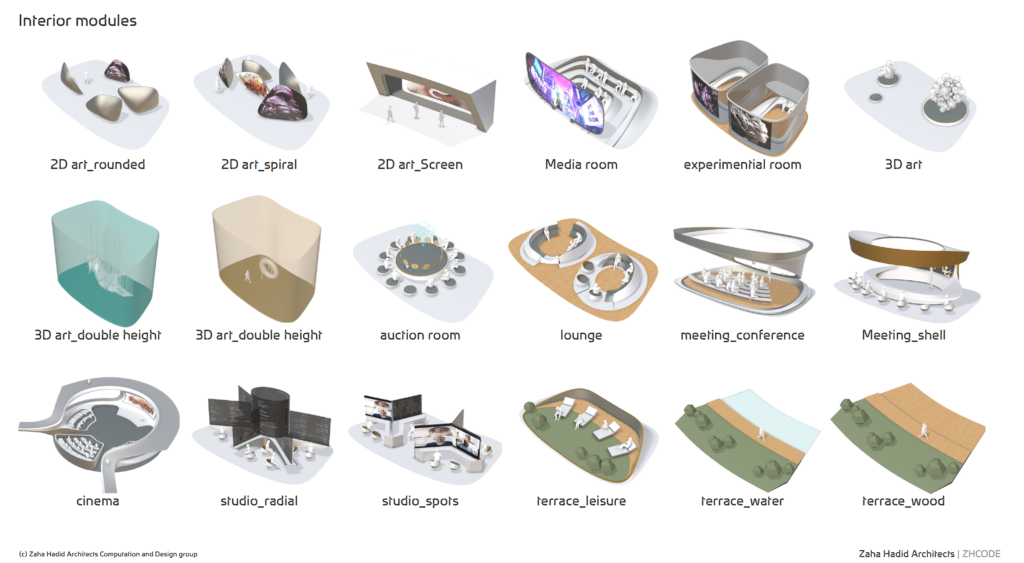Procedural Architectural Design: for the immersive, multi-player internet
Instructors: Jennifer Durand / Keerti Maney / Sergio Mutis
Dates: July 22, 23, 24, 25, 26, 27, 28, 29
Themes: computational design / digital spatial environments
Software: Autodesk Maya / Unreal Engine
Number of Students: 25
This workshop is full. Please see the YouTube link during the workshop to follow recordings.


Description:
In an increasingly digitally native society, it is architects, not graphic designers or gaming engineers, who should lead the design exploration of our digital spatial environments (Schumacher, 2022). Within this context, the last decade has seen a renewed and increased interest in the immersive spatial web, featuring procedurally aggregated cyberspaces that enhance gaming performance and scalability (Louth et al,2022). However, the spatial implications of these procedures and their gamification has been largely overlooked. And thus, this workshop seeks to delve into an experimental methodology for computational space generation that addresses these crucial topics.
The workshop will feature the design of a catalog of primitive spatial modules, the procedural aggregation of the catalog into large-scale spatial assemblies, and the gamified evaluation of the resulting architectures through tangible metrics like connectivity and spatial variety. It is suited for participants interested in leveraging current computational design frameworks, such as procedural aggregation, as valuable tools in the shaping of our digital spatial environments.
Bibliography:
Schumacher, P. The metaverse as opportunity for architecture and society: design drivers, core competencies. ARIN 1, 11 (2022). https://doi.org/10.1007/s44223-022-00010-z
Louth, H.D., Bhooshan, V., Bhooshan, S. (2023). “Democratizing Tectonism: High Performance Geometry for Mass-Customization of Virtual and Physical Spaces “ In: Morel, P., Bier, H. (eds) Disruptive Technologies: The Convergence of New Paradigms in Architecture. Springer Series in Adaptive Environments. Springer, Cham. https://doi.org/10.1007/978-3-031-14160-7_13
Objectives:
- Develop a design catalog of primitive spatial modules
- Explore the different combinations of the spatial primitives above
- Generate a series of procedural aggregation studies resulting in large-scale spaces
- Run algorithmic-based evaluations of the resulting structures (for instance, connectivity & spatial variety)
Expected Outcomes:
- Catalog of primitive spatial modules
- Combinatorics diagram displaying encoded rulesets
- Catalog of procedural aggregations with connectivity, spatial variety, and footfall metrics
- Video of aggregation gameplay with evaluation analytics
- High-resolution images of final aggregations

Detailed workshop structure for each day:
| Day # | Time (local) | Content |
| Day 1: July 22 | 10 am – 2 pm (GMT+1:00) London, United Kingdom | Welcome / Introduction to AG / 3D module development |
| Day 2: July 23 | 10 am – 2 pm (GMT+1:00) London, United Kingdom | Procedural Aggregation / Gamification / Analytics and feedback |
| Day 3: July 24 | 1 pm – 2 pm (GMT+1:00) London, United Kingdom | Design Review / Rest of the day design development |
| Day 4: July 25 | 1 pm – 2 pm (GMT+1:00) London, United Kingdom | Design Review / Rest of the day design development |
| Day 5: July 26 | 1 pm – 2 pm (GMT+1:00) London, United Kingdom | Design Review / Rest of the day design development |
| Day 6: July 27 | 1 pm – 2 pm (GMT+1:00) London, United Kingdom | Design Review / Rest of the day design development |
| Day 7: July 28 | 1 pm – 2 pm (GMT+1:00) London, United Kingdom | Design Review / Rest of the day design development |
| Day 8: July 29 | 12 pm – 1 pm (GMT+1:00) London, United Kingdom | Final review |

Jennifer Durand:
Jennifer Durand is a part of the Computation and Design Research Group at Zaha Hadid Architects (CODE). She is a certified Architect in Peru. She holds a master´s degree in Architectural Management and Design from the IE University in Madrid, Spain, and a bachelor´s degree in Architecture and Urbanism from Ricardo Palma University in Lima, Peru. Before joining ZHA, Jennifer worked in her own studio called OLA focused on web3 design and in OVA focused on small to medium commercial and housing projects.
Jennifer has also taught at the Ricardo Palma University as main professor from 2020 – 2022, she was assitant professor at the same university from 2019 -2020, she has also taught different workshops about application of technologies on design.
Her metaverse projects has been published in Archdaily, Parametric Architecture, peruvian television channels and newspapers. Her interest lies in metaverse design and ai-focused architecture.

Keerti Maney:
Keerti is a part of the Computation and Design Research Group at Zaha Hadid Architects (CODE). She is a certified Architect in India and holds a master’s degree in Architecture and Urbanism from Architectural Association (AADRL), London. Before joining ZHA, Keerti worked at Populous and was involved in several large scale Sports and Entertainment Stadia projects across the Asia Pacific Pacific Region with a special focus on computational form finding, rationalization of complex Architectural Geometries for construction and energy simulations.
She was briefly involved as a technical tutor in Shajay Bhooshan studio in Architectural Association, Design Research Lab and has previously led workshops at National Association of Students of Architecture, India. Her post graduate work and research interests lie in the intersection of Game Technologies, Artificial Intelligence and Computational Design for the Metaverse.

Sergio Mutis:
Sergio is a part of the Computation and Design Research Group at Zaha Hadid Architects (CODE). He is a certified Architect in Colombia. He holds a master’s degree in architectural design with distinction from the Bartlett School of Architecture of University College London, UK, where his graduation project received the Bartlett AD Gold Medal, and a bachelor’s degree in architecture from Pontificia Universidad Javeriana, Colombia, where he was granted the Order for Academic Merit. Before joining ZHA, Sergio worked in Spain, the US, and Colombia, developing architectural projects across 4 continents.
Sergio is also a visiting tutor at the Innovation Design Engineering joint MA/MSc program between Imperial College London and the Royal College of Art, and an assistant technical tutor at the AD M.Arch program at Bartlett School of Architecture of UCL. His research interests lie at the intersection between distributed robotics, artificial intelligence, and computational design.
